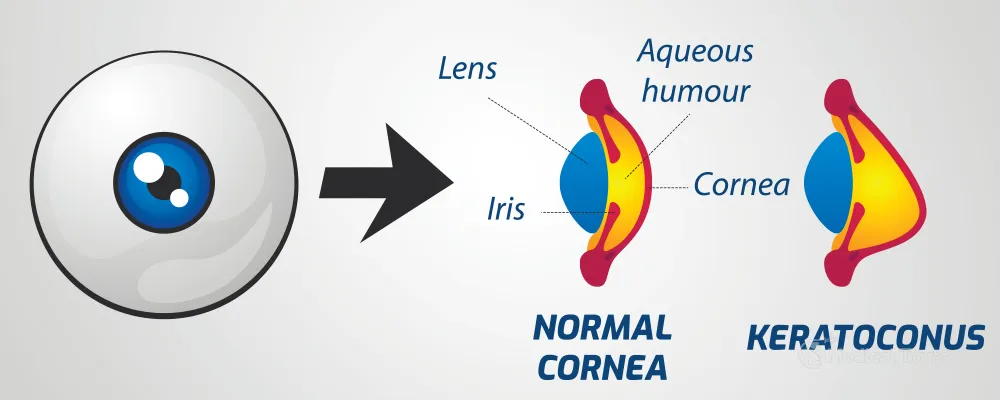Corneal transplant surgery is a type of surgery which is also known as the corneal grafting, in this advanced surgical process, the damaged or diseased cornea is replaced by the healthy corneal tissue (the graft). It is an important surgery because it is used to restore the functional vision of the human eye.
The cornea is a type of transparent layer. This transparent layer is like a domed-shaped structure. It helps in protecting the eye from harmful external agents. These external agents can be dirt, germs, and other particles. Moreover, it also helps protect the eye from harmful ultraviolet rays. Another major task of the cornea is to focus the intake of the light according to the surroundings. It is responsible for limiting the amount of required light in the eye. Therefore, that is how it contributes to providing a clear vision. Corneal transplant surgery helps to restore the vision of the person. Surgery is applicable or suggested by doctors if the medicines, as well as other methods, are not effective in the treatment.
Many times, people think about the question of who needs a corneal transplant. Well, different conditions are responsible for choosing a corneal transplant. These conditions differ in terms of every patient. The conditions that damage and disfigure the cornea directly as well as indirectly impair one's ability to see. Therefore, a person who is not able to see properly, or needs to have corneal transplant surgery. There are several conditions and some of them are listed below
There are also certain infections of the eye that cause damage to the cornea and hence result in blurred vision or unclear vision.
Traumatic injuries that happen because of some mishap can be natural or as well as non-natural. Hence, causing serious injury to the cornea results in damage. It is to the level where a person can have permanent vision impairment. If a person has gone through any previous eye surgeries somehow damage the cornea and therefore result in vision impairment.
Bullous Keratopathy is a type of condition in which the cornea swells like a blister and it causes eye discomfort, pain, and blurred vision.
Keratitis is a type of eye condition in which corneal inflammation happens because of viruses, bacteria, fungi, or parasites.
Trichiasis is a type of condition where eyelashes turn inward and cause friction against the surface of the eye, causing scarring and loss of vision.

Given above are the certain conditions because of which your surgeon recommends a corneal transplant. If these conditions can be treated in the early stages, then the corneal transplant is not necessary otherwise it solely depends upon the diagnosis of an individual by the medical experts. Therefore, your surgeon recommends a corneal transplant if you have vision impairment because of these conditions. A corneal transplant can help in restoring the vision of the person, but the person might need corrective lenses afterward. The corneal transplant can even reduce and provide ease in the pain that is associated with eye diseases and problems. Hence, your doctor might recommend it if you are having vision loss or if you are having an inconsiderable amount of pain.
Before going for the corneal transplant, a thorough eye examination, as well as diagnosis, is a must. Moreover, the recommendation of the doctor is very important. So, during the eye examination as well as diagnosis, the doctors will evaluate and check the condition of the eye. This examination helps them in the surgery as well as after the surgery (conditions that can cause complications post-surgery). Apart from this, other different factors need to be taken into consideration, for instance, the size of the eyes. Hence, measuring the size of the eyes is a very important task. Measuring the size helps in determining the size of the donor’s cornea. Before the surgery, your doctor might ask you to stop taking certain medications or supplements. Moreover, some infections can cause unsuccessful corneal transplants. Hence, the infection needs to be treated first and after that, you can proceed with the surgery. Your doctor might recommend you take antibiotic eye drops to reduce the chances of eye infection. Most of the time, these corneal transplant surgeries are done as outpatient procedures, which means the patient can go home the very same day. The patient need not eat anything before the surgery. He or she will be asked to do so the night before the surgery. The patient can have apple juice, water, and plain coffee or tea (without cream or sugar) for up to two hours before surgery.
In most cases, the surgery is done on an outpatient basis. During the surgery, the patient will be given a sedative to help him or she relax. After that, he or she will be getting anesthesia to make the eye numb and after that, the eye will be washed and cleansed. Now, the eye is still, and the doctors proceed with the procedure the surgery. In this procedure, the doctors make highly precise cuts on the cornea for its removal. The whole process is done under a microscope. An object known as a trephine which looks like a circular cookie cutter instrument is used to remove the center of the diseased or damaged cornea. Throughout the process, the overall surgery is done on the central portion of the cornea. After that, the surgeon excises an appropriate circular disc of the patient’s cornea and replaces it with a similarly sized disc of the donor’s cornea, which is then sutured into place.
There are in total five layers in the cornea. While corneal transplant all the five layers are not replaced. Only the required ones are replaced. For instance.
Full-thickness corneal transplant is a type of corneal transplant that involves all the layers of the cornea getting replaced or transplanted. The surgeon sews the new cornea onto the eye of the patient and uses stitches that are thinner than hair. The surgeon will perform this surgery if the cornea of the patient is extremely damaged or diseased.
Thickness corneal transplant or deep anterior lamellar keratoplasty (DALK) - Partial thickness corneal transplant is a type of corneal transplant surgery that involves the involvement of only some or certain layers of the cornea that need to be transplanted.
Endothelial keratoplasty is a type of corneal surgery that is used to treat conditions like Fuchs' dystrophy and other medical conditions. It is also known as Descemet's stripping endothelial keratoplasty (DSEK or DSAEK). It is one of the most common types of endothelial keratoplasty in which the surgeon removes the endothelium (it is a single layer of cells on the inner surface of the cornea.). The surgeon will replace these layers with a donated endothelium and Descemet membrane that is still attached to the stroma. It is the cornea's thick middle layer that helps surgeons to handle the new tissue without damaging it.
The cost of corneal surgery in India usually ranges between USD 2522 to 3090 (INR 2,00,000 to INR 2,45,000). But this is not the exact amount or cost, although it is only an average cost that can be seen for the surgery. Apart from this, the cost is also affected by all these factors like type of hospital, surgeon fee, location etc.
Corneal transplant surgery is a type of surgery, in which the damaged or diseased cornea is replaced by a healthy cornea.
The cost of corneal surgery in India usually lies between ₹2,00,000 to ₹2,45,000. And it can differ as per the different factors.
At the top eye clinics, the success rate of corneal transplants is more than 95%.
It is a type of corneal transplant that involves all the layers of the cornea getting replaced or transplanted.
